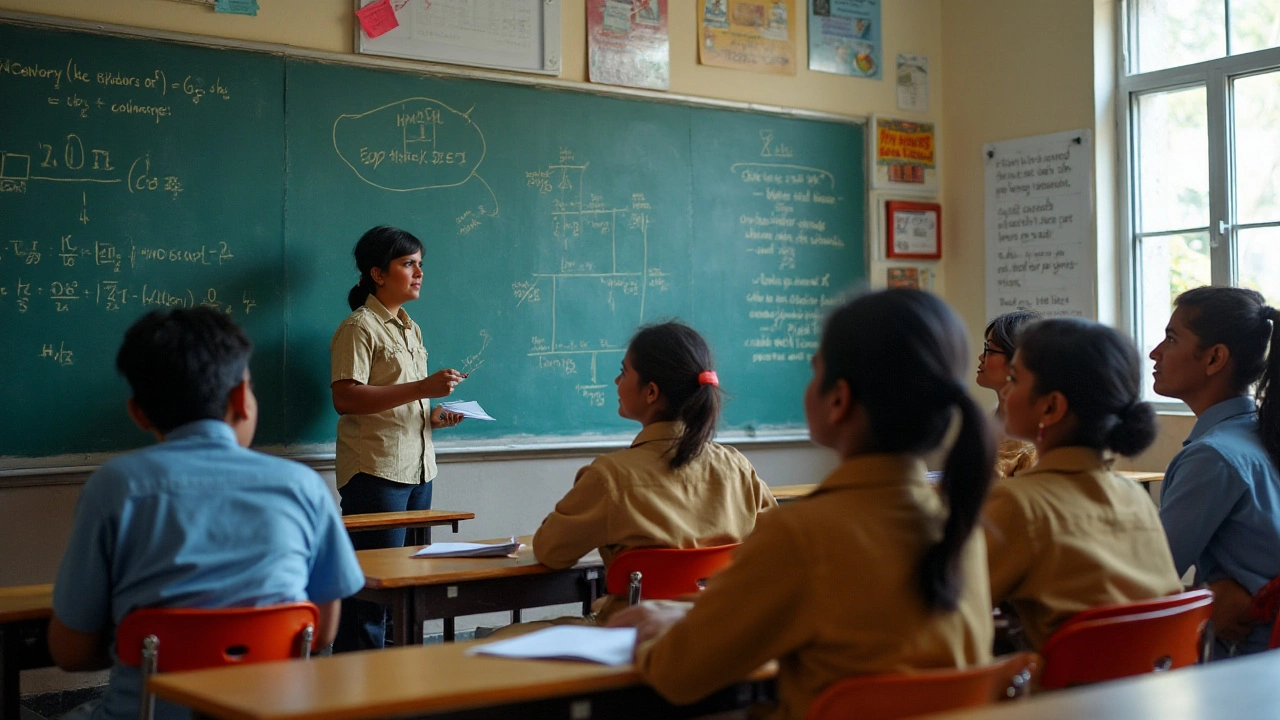Embarking on the journey to crack the IIT JEE isn't just about opening textbooks late in high school. It's often a decision that kickstarts much earlier. Many students and parents often wonder about the ideal class to begin preparation.
Building intellectual rigor and a sharp mindset from an early age can provide significant headway. This article delves into the pros of starting early and how it can pave the road for better preparation. We'll explore strategic insights into breaking down subjects and adopting personal study plans that are known to work wonders.
- Importance of Early Start
- Building a Strong Foundation
- Tailoring the Study Plan
- Tips for Staying Ahead
Importance of Early Start
When it comes to preparing for the rigorous IIT JEE exams, the adage 'the early bird catches the worm' rings true in the halls of academia. Beginning preparation early isn't merely about getting a head start; it's about laying down a strong academic foundation, where the basics of Mathematics, Physics, and Chemistry are not only understood but mastered. Students who initiate their journey towards IIT JEE in classes 8th or 9th often develop a comprehensive conceptual clarity by the time they reach 11th and 12th grades. This approach provides them a depth of understanding, allowing them to tackle complex problems with ease when the stakes are high.
Engaging in early preparations allows students to manage their time efficiently over a prolonged period, resulting in less stress closer to the exam dates. When concepts are introduced gradually over the years, rather than crammed into the last two years, students can enjoy the process of learning, rather than succumbing to pressure. There's ample opportunity for disciplined revision cycles which are often the key to retaining tricky concepts. Top educators point out that ‘consistency’ is the companion of success, making steady effort over time the champion strategy.
Institutions often encourage the cultivation of curiosity and analytical thinking from a young age. This encourages students to delve deep into subjects outside of the conventional syllabus. Extracurricular explorations fostered by an early start can significantly impact their ability to think critically, an invaluable skill in solving the unpredictable nature of IIT JEE questions. Students who engage themselves in competitions, olympiads, and additional learning resources at a younger age frequently find themselves thinking out-of-the-box, a requisite for innovation and success in such competitive examinations.
The famed mathematician, John von Neumann, once quipped, "In mathematics, you don't understand things. You just get used to them." An early start ensures that students don’t just acclimatize to cramming formulas, but they embed understanding deep within.
Moreover, ensuring that the study habits formed early are aligned with a personalized learning style means less trial and error later. Instituting a plan that caters to strengths while addressing weaknesses can include detailed strategies, such as deliberate practice through problem-solving, setting goals, and using feedback mechanisms to self-correct. Great attention is given to building a strong framework for studying efficiently that students can carry into advanced classes and beyond.
Decades of trends and expert opinions vouch for this early preparation strategy. A report from the National Institute of Open Schooling suggests that students beginning their preparatory journey in grade 8 show a significantly higher success rate in competitive exams, including IIT JEE. Adopting early planning, integrating technologies such as learning apps and online classes, and creating robust study timetables not only makes efficient use of time but also instills an infectious enthusiasm for continuous development.

Building a Strong Foundation
When it comes to preparing for the IIT JEE, starting with a strong foundation in the underlying subjects is essential. This means paying close attention to the core subjects, namely Mathematics, Physics, and Chemistry, right from the beginning. These subjects are not just pillars for the examination but are also crucial for understanding complex problems that could appear. By the time the students reach higher classes, they are expected to have not just theoretical but also a practical understanding of these subjects, integrating them into the broader context of solving real-world problems. A focus on concept clarity and rigorous practice should be at the center of any preparation strategy. Many experts agree that understanding the basic principles thoroughly is far more effective than attempting to memorize solutions. Strong basics allow students to adapt and tackle new, complex problems with ease, which is a key component of success in the IIT JEE.
It's worth noting that a structured approach to learning these subjects can prove beneficial. Students and educators often create a roadmap that covers both the junior and senior classes, emphasizing detailed subject matter and study consistency. For instance, mastering algebra and calculus early on can significantly alleviate the pressure during the final preparation stages. This systematic approach also allows students to build a repertoire of problem-solving techniques, which are crucial in addressing unfamiliar questions under exam conditions. According to a renowned academic figure, Dr. Shubham Raj, "The difference between winning and losing in competitive exams often lies in one's ability to thoroughly understand and apply basic concepts."
The difference between winning and losing in competitive exams often lies in one's ability to thoroughly understand and apply basic concepts.
Aside from focusing on individual subjects, integrating interdisciplinary methods can enhance understanding and retention. Combining concepts from different subjects can offer a new perspective and often open doors to innovative solutions that students hadn't considered before. For instance, applying physics concepts to understand chemical reactions, or vice versa, can significantly deepen a learner's insights. In addition to traditional learning methods, leveraging digital resources such as online courses, educational videos, and interactive problem-solving platforms can supplement classroom learning. With this varied approach, students can confidently tackle questions that challenge their cognitive abilities and require creative thinking.
A statistical view of the impact of early focus on foundational subjects shows promising outcomes. A survey conducted in 2023 among IIT aspirants showcased that students who started their IIT JEE preparation as early as class VIII had an 85% higher chance of securing a seat in prestigious institutions, compared to those who began a little later in their academic journey. This data underlines the significance of a strong academic foundation early on, coupled with consistent practice over the years. The combination of proactive learning and utilizing available resources is a tried and tested method that not only prepares students for the IIT JEE but also equips them with skills valuable for future academic and professional pursuits.

Tailoring the Study Plan
When it comes to preparing for the IIT JEE, carving out a personalized study plan is crucial. Each student carries a unique learning style and pace; recognizing this can transform the journey into one that's not only fruitful but also manageable. The first step is self-assessment. Understanding strengths and weaknesses in subjects like Mathematics, Physics, and Chemistry is pivotal. Tackling these subjects with equal enthusiasm is essential, yet allocating more time to challenging areas helps in building confidence and competency. Regular self-evaluations can keep aspirants on track, ensuring effective utilization of time.
Creating a weekly schedule that's structured yet flexible encourages disciplined yet stress-free learning. It's important not to cram in endless hours of study. Instead, allocate time for breaks and recreational activities. Many successful students vouch for a balanced approach where study hours are interrupted with short breaks. Our brain needs time to process and retain the information. Techniques like the Pomodoro method can be particularly beneficial, where study sessions are divided into focused 25-minute intervals followed by a 5-minute break. Customizing this to fit personal needs can enhance retention and comprehension rates.
Indeed, the resources one chooses to study are significant. Every subject for the IIT JEE comes with recommended books written by renowned authors. For starters, books like 'Concepts of Physics' by H.C. Verma and 'Mathematics for Class 11 & 12' by R.D. Sharma can be invaluable. However, it's important that students do not get overwhelmed by the plethora of material available. It's better to master a single text thoroughly than to skim through multiple ones. Combining these with online resources can be particularly advantageous, as many platforms offer interactive lessons and practice tests tailored to individual needs.
Practice tests play a vital role in a successful study plan. Incorporating regular assessments into the schedule helps gauge progress and acclimatize with the exam pattern. Mock tests, which imitate the real exam, can also help in managing exam-day anxiety. Setting up an environment that mimics real exam conditions is advisable. It trains the mind to focus and adjust to the pressures and constraints of time. A steady increase in the frequency of these practice tests as the exam date approaches can significantly aid in improving a student’s demeanor and ability to tackle the final hurdle.
"Education is not the learning of facts, but the training of the mind to think," said Albert Einstein. This quote highlights the essence of truly effective study plans, which are those that prioritize critical thinking and understanding over rote memorization.
Lastly, revisiting concepts regularly is recommended. The cumulative nature of the IIT JEE subjects means that concepts build upon one another, requiring a good grasp of basics. Weekly revisions and periodic deep dives into complex topics can ensure that knowledge stays fresh. This practice of consistent revisiting is what supports the sturdy foundation that IIT aspirants will stand upon as they walk into their examination centers, ready and confident.

Tips for Staying Ahead
In the race to excel in the IIT JEE, staying ahead requires more than just putting in hours at the study table. It's a game of strategy, self-awareness, and adaptability. One critical tip is to develop a deep understanding of concepts rather than relying solely on rote memorization. This approach fosters intellectual versatility and enhances problem-solving skills — both essential for cracking competitive exams. Taking regular mock tests and timing oneself can simulate the pressure of the actual examination and help identify areas that need more attention. Attempting a variety of questions daily keeps your mind agile and ready for any challenges the examination might throw your way.
Moreover, prioritizing a well-structured routine is invaluable. The key is consistency and a balanced approach combining intense study sessions with adequate breaks. Create weekly goals that align with your ultimate objectives and offer yourself incentives for meeting those milestones. Surround yourself with material that enriches your understanding of topics; consider educational videos or group discussions that can offer fresh perspectives. Remember, your health and well-being are just as crucial as your preparation strategy. Regular exercise, a balanced diet, and sufficient sleep go a long way in maintaining mental acuity.
Listening to advice from those who've succeeded can provide an excellent compass for your journey. As Chetan Bhagat, a notable IIT alumnus, once said,
"Don’t just try to find time to study, make time to study, but also make time to sleep well and exercise."Embracing this holistic practice can ensure that your body and mind are in sync for the rigor that IIT JEE demands. Remember, your study activities should include regular interactions with peers and mentors, contributing to a comprehensive understanding of even the most challenging concepts.
A proactive approach also involves keeping track of the ever-evolving IIT JEE patterns and syllabi. Past papers serve as a goldmine of insight into the trending types of questions. Analyze these papers thoroughly to understand the weightage of each topic. Keeping a journal or digital notes of your doubts and the subsequent clarifications received can offer you a personalized reference guide as you progress. Consider joining study forums or communities where you can share knowledge and gather tips from a broader pool.
Organizing information effectively can be done with simple tools like mind maps or flashcards. With technology, multiple apps are available, providing innovative ways to review and retain critical formulas and theories. Crafting a schedule that allocates time for unpredictable circumstances ensures that you're never caught off-guard. And, sometimes, getting this balance right involves being open to alterations in your study methodologies to adapt to what's most effective for you. Staying ahead in IIT JEE demands a high degree of self-motivation; thus, celebrate small victories to keep the spirit alive.

